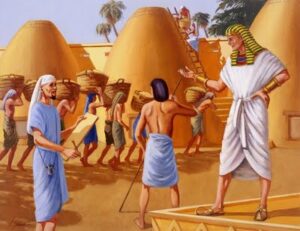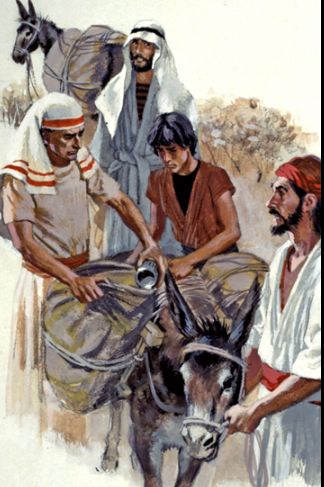
God Delivers Israel
It is amazing to observe Joseph’s rapid ascension to power in Egypt which is described ![]() in Gen. 41:37-57 – twenty verses with God’s sovereignty on full display. It is important to remember that Joseph was God’s servant, His instrument to bring about deliverance from the famine not only for all of Egypt, but also for the people of Israel as well and the surrounding region. Our observations of Joseph’s character in the previous chapters guide us to understand his humble and faithful administration of responsibility. He had endured years of suffering and separation from his family, but his faith in God had held firm and now he was prepared by God for this great work. Now he would guide with a firm and equitable grasp of his authority under Pharaoh, and notably also under the sovereign authority of God, as we know this entire sequence of events has proceeded under God’s sovereign watch. The seven years of plenty were blessed with abundant crops which were put into storage. Then came the seven years of famine where Joseph’s power was exercised
in Gen. 41:37-57 – twenty verses with God’s sovereignty on full display. It is important to remember that Joseph was God’s servant, His instrument to bring about deliverance from the famine not only for all of Egypt, but also for the people of Israel as well and the surrounding region. Our observations of Joseph’s character in the previous chapters guide us to understand his humble and faithful administration of responsibility. He had endured years of suffering and separation from his family, but his faith in God had held firm and now he was prepared by God for this great work. Now he would guide with a firm and equitable grasp of his authority under Pharaoh, and notably also under the sovereign authority of God, as we know this entire sequence of events has proceeded under God’s sovereign watch. The seven years of plenty were blessed with abundant crops which were put into storage. Then came the seven years of famine where Joseph’s power was exercised  heavily in order to control the food supply. Just imagine the scope and weight of all the organizational, personnel and production activities that had to occur in such a short amount of time. The overall message is that God guides the affairs of man so that He can accomplish His plans for His covenant people, and He often does so through the hands of God-honoring saints. As we move on through these chapters, we see the “good hand” and the “strong arm” of the Lord (Deut. 7:19; Psa. 118:16; Isa. 59:1) are on display as God cares for His people and leads them forward through His plan. While the Genesis narrative is continuing the history of God’s chosen people as they are led by the Patriarchs, the story is currently focused on Jacob and his clan, and at this point the focus turns to Joseph.
heavily in order to control the food supply. Just imagine the scope and weight of all the organizational, personnel and production activities that had to occur in such a short amount of time. The overall message is that God guides the affairs of man so that He can accomplish His plans for His covenant people, and He often does so through the hands of God-honoring saints. As we move on through these chapters, we see the “good hand” and the “strong arm” of the Lord (Deut. 7:19; Psa. 118:16; Isa. 59:1) are on display as God cares for His people and leads them forward through His plan. While the Genesis narrative is continuing the history of God’s chosen people as they are led by the Patriarchs, the story is currently focused on Jacob and his clan, and at this point the focus turns to Joseph.
Following the exciting deliverance of Joseph from prison, and the miraculous revelations from Pharaoh’s dreams, the power of God continues to be manifested as the seven years of famine occur, and concurrently as He leads Joseph through the challenges of the overwhelming tasks he was assigned to. God allowed Joseph to enjoy the joys of marriage and family, and he was successful at leading the country as it prepared for famine. It is also remarkable to see this great nation fully believing the message from the God of Israel of the coming famine. Note that Joseph’s own family in Canaan didn’t have the benefit of that revealed plan from God as they struggled with the famine, but God did move in Jacob’s heart to insist that his boys get down to Egypt quick. God works in mysterious ways.
Please pause here and open your Bible and read through Genesis 42-50 in one sitting before you continue on through this Bible Study.

God’s Good Hand Prevails
Reality and Desperation Take Hold, Gen. 41:53-42:5
So, as is true about God throughout the Bible, God does what He says He will do. The s even years of bountiful harvest came to an end, suddenly no crops would grow anywhere, and the entire nation began coming to Joseph’s administration to receive distributions of food. Heathen Egypt was receiving food from the hand of the One True God to care for their families, under the leadership of a Man of God – wow! There are certainly many times in Bible history where God reaches into the affairs of man to provide guidance and sustenance. Israel wandering in the wilderness comes to mind, or Jesus’ feeding the 5000. God leads His people along, and He always maintains His work of redemption and deliverance.
even years of bountiful harvest came to an end, suddenly no crops would grow anywhere, and the entire nation began coming to Joseph’s administration to receive distributions of food. Heathen Egypt was receiving food from the hand of the One True God to care for their families, under the leadership of a Man of God – wow! There are certainly many times in Bible history where God reaches into the affairs of man to provide guidance and sustenance. Israel wandering in the wilderness comes to mind, or Jesus’ feeding the 5000. God leads His people along, and He always maintains His work of redemption and deliverance.
The severity of the famine did reach to Canaan and Joseph’s family. Jacob and his sons were frantic to find food (Gen. 42:1-2). Of course, they had continued life in their selfish and godless ways after selling Joseph, so they were just standing there with no clue as to how to provide for their families. Their father Jacob told his sons they had to go to Egypt – now! It bears mentioning that this was the sovereign hand of God on Jacob’s heart. Also note that God prompted him not to allow Benjamin to go, although that is understood as he is now Rachel’s only true son. So the guys packed up and headed out on their 250 mile trek, about a 13-15 day trip although they probably had camels and that might have helped. This was a risky decision – there would be dangers enroute, and then there were the prospects of being seen in Egypt as suspicious foreigners. But it was time for them to bow down before Joseph!
The Brothers Encounter Joseph, Gen. 42:6-24
There was some type of central/regional clearinghouse system by which the stored food supplies were dispensed, and when the brothers arrived, they apparently were given a short path to the right location so that they arrived where Joseph just happened to be visiting  that day. This is truly a bright burst of light as God sovereignly brings the brothers before the one whom they had agreed they would report was “no more” (Gen. 42:13). In this large country, food distributions were actually being done in several cities (41:48), and it probably would not have been expected that the second most powerful man in Egypt would have been at any of the sites supervising operations. Yet it was God’s providential grace that brought Joseph there that day. They didn’t recognize him since he was completely assimilated into Egyptian culture, complete with the native language and appearance. As they bowed before him, just imagine the heavy rush of emotion Joseph would have had as he recognized them (42:8) them bowing before him (note the reality of Joseph’s earlier dream). These are the ones he had pled with to let him out of that well, but they were unrelenting and they had gladly taken payment in return for his slavery.
that day. This is truly a bright burst of light as God sovereignly brings the brothers before the one whom they had agreed they would report was “no more” (Gen. 42:13). In this large country, food distributions were actually being done in several cities (41:48), and it probably would not have been expected that the second most powerful man in Egypt would have been at any of the sites supervising operations. Yet it was God’s providential grace that brought Joseph there that day. They didn’t recognize him since he was completely assimilated into Egyptian culture, complete with the native language and appearance. As they bowed before him, just imagine the heavy rush of emotion Joseph would have had as he recognized them (42:8) them bowing before him (note the reality of Joseph’s earlier dream). These are the ones he had pled with to let him out of that well, but they were unrelenting and they had gladly taken payment in return for his slavery.
It is as if Joseph had already considered the possiblity of this happening, and seemingly had his plan in mind as he interrogated them for their intentions. He still knew the Hebrew language so he understood what they said to each other (42:23) but they didn’t understand what Joseph would say to his staff. Accusing them as spies (42:9-14), he presented his offer for freedom: one of them (42:16) was to go back to Canaan and get Benjamin – to start, they would all be in prison for three days, in order to impress them with the severity of the situation. After the three days in jail, they were given a different ultimatum: one of them stays in Egypt in prison, the rest go back to get their younger brother.
Joseph then hears Reuben (Gen. 42:22) saying to the others that he had tried to persuade the others not to sell Joseph, and they were guilty of his death. Joseph was caught up emotionally as he heard them talking. Note that in v.18, he had indicated to them that he did believe in the One True God (Elohim), so they were led to believe he was being honest with them. When he recovered his composure, he revises his plan: one would stay in prison, all the rest would go back for Benjamin.
The Strong Arm of God
As we grow in the Lord and get to know Him through His Word, we begin to see both His “good hand” and His “strong arm” active in our lives. God works for good in our life, but He will also work to test and correct us (Rom. 8:28-29; James 1:2-14). After Israel’s second return from captivity, Ezra expressed this in his writing – see Ezra 7:28; 8:18, 22, 31,33. We can only imagine the testimony that Joseph might have given at some point considering the dramatic power God demonstrated through him. God wants us to be an “instrument of righteousness” in His hand (Rom. 6:13). In this account of Genesis with Joseph and his family, we see God at work extending mercy and grace to him and his family and to all the nation of Israel. God prevails in small, personal matters, and nation-moving decisions. Pause to see the mighty arm of God in these events.
In Gen. 42, we observe Joseph’s brothers shaking in their boots, standing before the one holding the power of Egypt over them and accusing them as spies — they were helpless! Only Joseph, intimately guided by God’s Spirit, could free them from their fate. God had prepared Joseph for this moment. His harsh words to his brothers were emotional but also strategic as God leads him to move them towards restoration. God really does care for His children and wants to recover, restore and reward those who bow before Him. Note in 37:21-22, as Reuben talks with his brothers, he unknowingly reveals to Joseph his effort to protect him from harm. Now the next step in Joseph’s plan would take him a major step forward in what God had in store for His people.
From Ultimatum to Action, Gen. 42:25-38
After giving the brothers his ultimatum, Joseph was deeply emotional and had to leave the brothers to recover from his emotions (42:24, the first of six such experiences), then Joseph returns before them (see 43:29; 45:2; 46:29; 50:1, 17). Wiersbe notes that what makes a person weep is a good test of character! He places Simeon in prison in order to hold them to their commitment that they would return to Egypt with Benjamin – that had to happen because his dream had shown that all eleven would bow before him. He then sends them on their way back to Canaan but they are not aware that he has loaded up their bags with food and money. At the end of the first day of travel (42:28, 35), they are gripped with conviction and fear as they discover this, thinking that they had been trapped – their guilty conscience was cutting deep. Reviewing these events with their father Jacob  when they returned (now not only Joseph but Simeon was missing), they told of the “man who is lord of the land” holding Simeon in prison. Then to make matters worse, they found that all their money had been hidden in their sacks (v35). Jacob was overwhelmed with anger and grief – they had taken Joseph and Simeon from him and now wanted to have Benjamin too – it was too much. Gen. 42:36, “all these things are against me”, he was giving up in despair. Joseph’s ultimatum hung in the balance, Jacob knew of the promises of God, but he was losing hope. Then Reuben stepped in.
when they returned (now not only Joseph but Simeon was missing), they told of the “man who is lord of the land” holding Simeon in prison. Then to make matters worse, they found that all their money had been hidden in their sacks (v35). Jacob was overwhelmed with anger and grief – they had taken Joseph and Simeon from him and now wanted to have Benjamin too – it was too much. Gen. 42:36, “all these things are against me”, he was giving up in despair. Joseph’s ultimatum hung in the balance, Jacob knew of the promises of God, but he was losing hope. Then Reuben stepped in.
Gen. 42:37, Reuben says he will protect Benjamin, and offered his own sons’ lives if he failed, a noble offer which Jacob prudently declined. The brothers were being forced to account for their guilt and realized God’s punishment was happening, — they wanted to care for their father, and God was bringing them to repentance. In 43:1 we see that Jacob has held off his decision until they were out of food, but now he tells them they must go back. In 43:9, Judah’s proposal to Jacob was accepted – he would bear condemnation alone if Benjamin isn’t returned. This Jacob agreed to because the famine was threatening to wipe out his entire family. Jacob’s challenge in 43:14 places the men under the care of “El Shaddai”, the Mighty God Who spoke to him in Gen. 35:11, the One Who overpowers, keeps His covenant promises and nourishes His people. Jacob’s weak faith however, showed through, not being sure that El Shaddai would protect his sons.
Welcome Back to the Family
The Brothers’ Reunion, Gen. 43:15-45:20
The brothers had much to think about as they traveled back to Egypt – they had to return the money found in their sacks, they wanted to see Simeon released, and they wanted to protect Benjamin. Gen. 43:15 doesn’t give us much detail, but as the men arrived in Cairo, Joseph was immediately alerted and the men were ushered into Joseph’s home, which would have been viewed as “hallowed ground” to the Egyptians. Gen. 43:16 reports that as the men are once again standing again before Joseph, the first thing he sees is his youngest brother, then he prepares for a grand feast. An interesting conversation between Joseph’s steward and the brothers, they are still attempting to argue their innocence, and the steward commented that God had already provided for them (43:23). As they are led to the dinner, they must have been wondering about that statement, seeing they are being treated kindly instead of being made slaves (43:18).
 Once the dinner with Joseph is begun, the brothers make the big presentation of gifts to Joseph sent by their father Jacob. Then Joseph asked about Benjamin and once again he is caught with emotional upheaval. The brothers also notice they are amazingly seated in order of age, causing them to look at each other wondering how that could have happened.
Once the dinner with Joseph is begun, the brothers make the big presentation of gifts to Joseph sent by their father Jacob. Then Joseph asked about Benjamin and once again he is caught with emotional upheaval. The brothers also notice they are amazingly seated in order of age, causing them to look at each other wondering how that could have happened.
In Gen. 44, Joseph tests his brothers. He allows them to be sent back to Canaan with their new supply of food, but sets them up for a test by hiding his personal cup in Benjamin’s bag. He waits for them to get out of the city, then he sends soldiers out to arrest them for stealing. The brothers knew they were innocent but the soldiers knew to look in Benjamin’s bag last and arrested him, and they all return to Joseph’s house, pleading before Joseph, “God has found out our inquity” (44:16). Judah speaks up, explaining about how how hard it was to get Jacob to allow Benjamin to go down to Egypt, and now when they show up without Benjamin, Jacob will surely die from grief.
The noble speech by Judah in 44:14-34 shows him stepping ahead of Reuben as leader of the family. It is notable not only because he spoke so clearly about guilt and forgiveness, but also because he maintains his position as leader of the clan in spite of his earlier history of sin and hate. He shows that his heart has changed and he sees how God has prevailed in their experiences.
At that point, Gen. 45, Joseph is overcome again by being with his brothers, and he clears the room to reveal himself to them. He wept so loud, all the palace servants could hear. As he finally speaks to the brothers in their native tongue (45:12), He confirmed to them that God had a purpose for allowing him to be taken to Egypt, it was to preserve a remnant of Abraham’s seed (45:7). Joseph then prepares great provisions for them to in take wagons back to Canaan and get Jacob and all the clan packed up and brought back down to Egypt.
Jacob Comes to Egypt, Gen. 46-50
When the brothers got back to Canaan, they worked quickly to convince their father Jacob to agree to travel to Egypt along with their whole clan. To them, it was for the sake of not having their family all die of hunger because of the famine. However, the sovereign plan of God had much greater purposes as He worked to preserve His people Israel and the seed of the Messiah. Gen. 46 provides great detail by enumerating the 70 members of the clan who made the trip – these are all direct descendants of Abraham, the people of Israel. Moses himself refers to the group in 46:8 as “sons of Israel”, that is Jacob, reaching back to include his father Isaac and grandfather Abraham. Note in 46:28 that Judah is designated by Jacob to represent the clan in announcing their arrival.
Joseph took the initiative to get approval from Pharaoh for the people of Israel to be located in Goshen (46:31-34). Goshen was somewhat separate from the main area of Egypt and provided well for the Hebrews’ care for livestock. This provision was God-given and a good place for His people (Gen. 47:27) to prosper. Regrettably, we are also aware that over time the people descended into slavery which lasted about 360 years (note how that fact fulfills a prophecy given by God to Abraham in Gen. 15:13-16.) Gen. 48-50 describe the last days of Jacob, his blessing for each his sons, and his burial. His request was to be buried at the site originally obtained by Abraham near Hebron.
![]() Bible Study Journal
Bible Study Journal
-
-
- How does Joseph’s obedience in prison prepare him to lead Egypt in its crisis?
- Was Joseph’s harsh treatment of his brothers the right approach appropriate?
- In what ways could Joseph be seen as a type of Christ?
- What do we learn about reconciliation from this account?
- What do we learn about sin and repentance? Does repentance happen all at once, or sometimes in stages? What does 2 Cor. 7:10 add to this?
- As Joseph learned more about God, what impact did that have on his wisdom and patience?
- Jacob stopped at Beersheba (Gen. 46:1) to offer a sacrifice on his way to Egypt – Why? (Gen. 21:31; 26:23)
-




